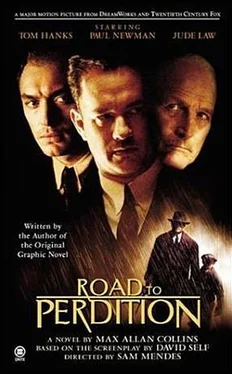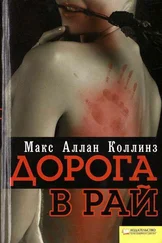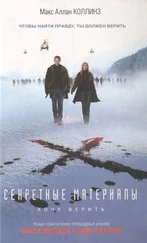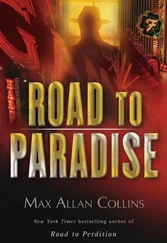“It is a problem,” Looney admitted, gesturing with open palms. “I am sincere that I will help, financially.”
Capone waved that off. “And as if all this isn’t enough, I’m spending a small fortune... the figure grows daily... bankrolling the efforts of somebody supposedly workin’ at stopping the O’Sullivan problem... a man I am assured, by those closest to me, is a ‘pro.’”
And Capone again cast his gaze on Maguire, who stood quiet, unflappable, as unreadable as Capone in his silences, but without the explosions of clarification.
“And what’s that mean?” Capone demanded of Maguire.
Maguire shrugged a little. “What does what mean, Mr. Capone?”
“That look.”
Not in the least afraid, Maguire replied, “I’m just giving you my undivided attention, Mr. Capone.”
“Every face has a look, kid. Except maybe the Invisible Man’s mug... is that who you are? The Invisible Man? Who’s got no ‘look’?”
“Al, come on,” Nitti said, the tension building, “he ain’t looking at nothing.”
“He’s looking at me, Frank. And I’m something. But the point is, he’s not doing anything. He’s takin’ pictures, he’s takin’ rides in the country, he’s standin’ there in my suite with a fuckin’ look... and I’m bleedin’ money all over the Bible Belt.”
Capone made a face, tasted his own mouth thickly, and went to his massive mahogany desk, where a pitcher of iced water and several glasses waited on a silver tray. He poured a glass and gulped it down.
“Satisfied, Frank?” he asked. “I’m drinking the water. I’m drinkin’ the fuckin’ water, like the doc wants. That should solve everything!”
Nobody said a word while Capone had another glass of cold water. Nitti exchanged a glance with Looney, then both men looked toward Maguire.
“Al,” Nitti said, “Mr. Maguire has a proposal for how we might resolve this difficulty. A way to stop your ‘bleeding,’ and at the same time bait a trap for O’Sullivan.”
Capone, affable all of a sudden, turned to Maguire. “Hey, I’m all ears. I’m a fuckin’ elephant, I got such big ears for ways for me to stop bleedin’. Propose to me, Mr. Maguire — show me why Frank Nitti says you’re the best... but do me a favor?”
“Anything, Mr. Capone,” Maguire said, with a tiny smile.
“Fucking blink once in a while.”
And Capone wiped off his brow and poured another glass of ice water, then headed over to the couch to flop there, and listen.
A week later, at the Grand Prairie State Bank in Grand Prairie, Oklahoma, Mike O’Sullivan was sitting across the desk from a bank manager, a younger man than most in his position. Very professional in dress and manner, the young bank manager was nervous, and clearly frightened.
“No need for fear,” O’Sullivan assured him. The black bag was open on the desk, the .45 in O’Sullivan’s hand. “This is strictly business. You won’t get hurt — no one will.”
“Mr. O’Sullivan, I’m sorry... I really am... ”
“Sorry?”
The bank manager, his eyes wide, shrugged helplessly. “There’s no money here for you.”
The gun snapped into position, leveled directly at the bank manager’s head.
“You don’t understand! Please... give me a chance to explain.”
“Do it, then.”
“I can get you money, of course we have money. But I know who you are, I’ve heard about you, I... it’s just, I don’t have Chicago money for you. They came around two days ago, and took it all out.”
O’Sullivan had been studying the man; the truth was written on his smooth, young face.
“Who took it out?”
“He was going around, with armed men, to all the banks. He’s been doing it for days.”
“Who?”
“The accountant. From Chicago.”
Alexander Rance , O’Sullivan thought; the mob accountant Frank Kelly had brought to the Looney board meeting, to try to make the case for getting involved with the unions.
“What was his name?” O’Sullivan asked, knowing.
“Rance,” the bank manager said. “Alexander Rance.”
O’Sullivan thought about that; then he asked, “You wouldn’t happen to know what Mr. Rance’s next stop is, would you?”
“Actually, I do. He left word where he could be reached until day after tomorrow, I believe.”
“Write it down for me.”
The banker did.
O’Sullivan dropped the slip of paper into the otherwise empty satchel, fastened it, put his gun-in-hand in his topcoat pocket, rose, and was almost out the door, when the banker asked a question.
“Is that... all?”
“I don’t want your money,” O’Sullivan said. “Just don’t mention the information I asked for — or that you gave me.”
“All right.”
O’Sullivan looked at the man, hard. “It’s important.”
“All right!”
“You don’t want to see me again, do you?”
“No.”
“Then keep your word.”
And he went outside, where his son — like clockwork — picked him up, eager to hear about the latest haul.
Not much is known of Alexander Adams Rance. He represented Frank Nitti’s shift toward a big business stance, including moving into legitimate enterprises, a radical approach for the criminal empire Johnny Torrio had founded and Al Capone made flourish. Rance was a Chicago boy — he grew up on the mid-South Side not far from State Street, ironically not far from where Capone maintained his Chicago residence. A graduate of the University of Chicago who worked on LaSalle Street before the crash, Rance was recruited by Nitti shortly thereafter .
That Rance exemplified a new generation, a new approach, can be demonstrated with a quick comparison to the one Capone man above him in the area of financial wizardry and creative accounting. Jake “Greasy Thumb” Guzik came up from the streets, a portly teenage pimp who had overheard a murder plot against Capone, reported this to Big Al, and earned a friend for life. Years later, when the porcine mob treasurer appeared before the Kefauver committee, he took the Fifth Amendment, saying he wouldn’t answer questions that would “discriminate against me.”
The smooth Rance, on the other hand, was like so many accountants and lawyers in that small white-collar army who did the bidding of thugs-made-good like Frank Nitti and, later, Paul Ricca, Tony Accardo, and Sam Giancana. By all accounts, a fussy man, particular about his food, dress, and lodging, Rance operated on Outfit finances in a fashion that isolated him from the violence inherent in such criminal activities as gambling, loansharking, prostitution, and bootlegging .
The accountant probably had no idea how much danger he was in when Nitti directed him to personally supervise the removal of mob money from midwestern banks. Rance was to select a hotel from which he could operate, in a given area, withdraw the money, and send it home to Chicago under armed guard, where the funds would go into safety deposit boxes in the kind of large, reputable Chicago banks that would be unlikely targets for my father .
Researchers — seeking information on the Chicago mob’s financial guru, whose reign was cut so prematurely short — discovered that Rance would seek a luxury hotel in a smaller town. He would then check into the bridal suite, apparently because that would represent the nicest accommodations available, and take all of his meals via room service, asking to speak to the chef, to whom he gave copious instructions on the preparation of his meals .
Breakfast in particular was a ritual to Rance — boiled eggs, runny, with crisp bacon... but not so crisp that the strips would break off when he inserted them into the yolk. This detail made it into the newspapers, when a reporter interviewed both the chef and the startled room service clerk, who’d been delivering the kitchen’s second attempt at Rance’s breakfast, shortly before the trouble began .
Читать дальше












